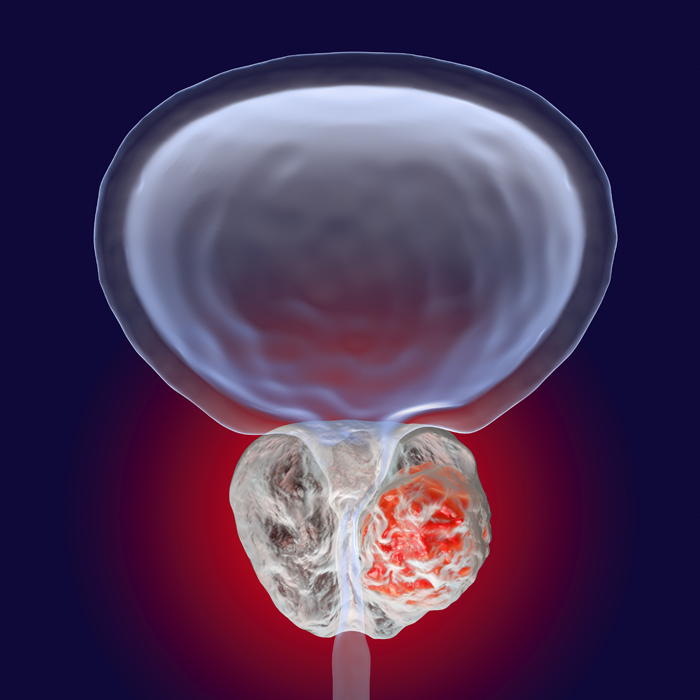Prostate cancer Treatment & Diagnostics in Karol Bagh, Delhi
Prostate cancer
Introduction to Prostate Cancer
Prostate Cancer occurs in the prostate. The prostate is a small gland present in males which is similar to a walnut in size and shape. It is responsible for producing seminal fluids (semen) that help in nourishing and transporting sperms. It is one of the top ten leading cancers in India.
Several prostate cancer cells grow gradually and are restrained to the prostate gland so they do not really cause severe harm. But, other types of cancer cells are quite aggressive and start spreading quickly. When detected early i.e. confined to the prostate gland, better chances of successful treatment can be expected.

About Prostate Cancer
Present in a male’s lower abdomen, the prostate is a small gland situated under the bladder and surrounding the urethra. The hormone testosterone regulates the prostate and forms seminal fluid known as semen.
When the abnormal and cancerous cells known as tumor starts forming in the prostate, it becomes prostate cancer. Prostate cancer is divided into two categories based on how fast it grows. They are aggressive (grows rapidly) and nonaggressive (grows slowly).
When you know the stage of prostate cancer, you can know better about your condition and the treatment options. In Stage 0, the precancerous cells form but affect only a small area as they grow slowly.
In the first stage, cancer is limited to the prostate gland only i.e. it is localized. Treatment can be very effective here. Stages 2 and 3 become regional as cancer starts spreading to the nearby tissues. Finally, in Stage 4, cancer starts spreading to the other body parts like lungs or bones and turns distant.
What are the Symptoms of Prostate Cancer?
In the early stages of prostate cancer, symptoms are usually hardly noticeable. However, screening helps in detecting changes that indicate cancer. The test measures the levels of PSA in your blood, so if there are high levels, you may have cancer. The symptoms include:
- Painful urination
- Frequent urge to urinate especially during nighttime
- Finding it difficult to start and maintain urination
- Blood in the semen or urine
- Finding it difficult to get or maintain an erection
- Experiencing pain or discomfort when you sit
- Pain on ejaculation
What are the Causes of Prostate Cancer?
There are no known causes of prostate cancer. It happens due to specific changes generally in the glandular cells. Almost 50% of all males over the age of 50 have cancerous or pre-cancerous cells in the prostate gland. In the beginning, the changes are slow and cells are not cancerous. But, they can turn cancerous over time, either high grade or low grade.
When to See a Doctor?
If you notice any persistent signs or symptoms which you think might be related to prostate cancer, consult your doctor right away. If you don’t have any symptoms, adopt a healthy lifestyle to reduce your risk of getting prostate cancer.
Request an appointment at Apollo Spectra Hospitals, Karol Bagh, New Delhi
Call 1860 500 2244 to book an appointment
What are the Risk Factors of Prostate Cancer?
Although prostate cancer can happen to any man, there are some risk factors that increase your chance of developing it. They include:
- Increasing age
- Family history of prostate cancer
- Obesity
- Genetic changes
- Certain ethnicities or race
What are the Treatment Options for Prostate Cancer?
Your treatment plan depends on your stage of cancer, age, and health status. If it is nonaggressive, active surveillance may be recommended. In simpler terms, treatment will be delayed to monitor cancer. But, with more aggressive kinds of cancer, your treatment options will include:
- Surgery: It involves the removal of the prostate gland, some surrounding tissues, and lymph nodes.
- Radiation: It uses high-powered energy for killing cancer cells.
- Cryotherapy: It involves the use of a very cold gas for freezing and thawing the prostate tissues. This cycle kills the cancer cells.
- Hormone therapy: This treatment stops your body from generating testosterone to kill cancer cells or slow their growth.
- Chemotherapy: It kills rapidly growing cells including cancer cells.
- Immunotherapy: It makes use of your immune system for fighting cancer.
Conclusion
While prostate cancer can happen to any man at any age, early detection and treatment can increase your chances for positive results. Thus, it is important to have open conversations with your doctor about it. Go for regular screenings and if you haven’t been to one, talk to your doctor about your options.
In the earlier stages, it does not. However, during the advanced stages, it may or may not impact your sexual ability. It mostly depends on your particular case.
There are various treatment options at all stages of prostate cancer. What is most important is to keep your loved one on the right track by ensuring they get the right doctor, right tests, and treatments from the very start.
Advanced prostate cancer cannot be cured. However, there are certain treatments that may extend life substantially and ease your symptoms.
Our Top Specialities
NOTICE BOARD
CONTACT US
CONTACT US
 Book Appointment
Book Appointment


.svg)
.svg)
.svg)
.svg)








